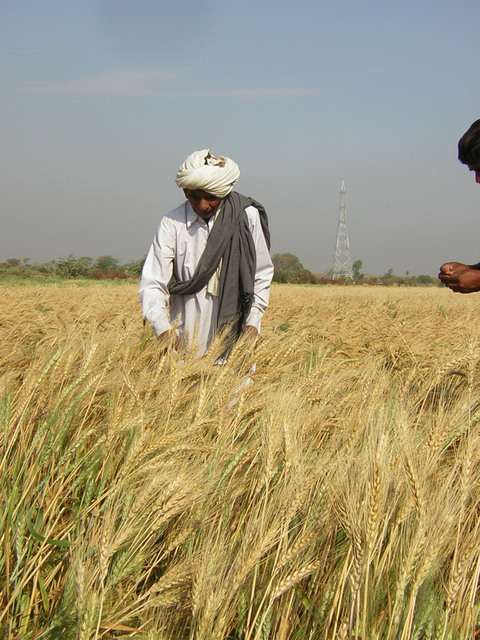|
CEREALS >> Daily Duties
 From the fruit trees, perennial and usually many-branched, is derived an important part of human food—the part that is most stimulating, pleasant, and refreshing; but the part that is most substantial and satisfying is derived from the lowly cereals. These are of humble growth, mostly of a single stalk. They produce their fruit quickly, and immediately perish; and therefore must be continually resowed, that there may be a succession of harvests. Their fruit is at first milky, but quickly dries and hardens, and must be both ground into meal and cooked by fire to prepare it for food. From the fruit trees, perennial and usually many-branched, is derived an important part of human food—the part that is most stimulating, pleasant, and refreshing; but the part that is most substantial and satisfying is derived from the lowly cereals. These are of humble growth, mostly of a single stalk. They produce their fruit quickly, and immediately perish; and therefore must be continually resowed, that there may be a succession of harvests. Their fruit is at first milky, but quickly dries and hardens, and must be both ground into meal and cooked by fire to prepare it for food.
We have seen that the fruits of trees correspond to various kinds of useful and interesting intelligence communicated from one to another: that the fruit of the olive represents intelligence concerning the goodness of the Lord; of the vine, intelligence in the wisdom of Christian charity; of the fig, in kindly beneficence; and of other fruit trees, intelligence in various social virtues and relations. Communication of such intelligence in social life is stimulating, pleasant, and refreshing; but this does not constitute the main satisfaction of life. The chief satisfaction of every day comes from doing faithfully the work of the day—the daily duties into which everyone puts his chief strength, and his best thought for the good of others. And these are the cereals; quickly sown and ripened, and constantly sown again; dry and monotonous; and yet full of love of work, and of satisfaction in its goodness. The pleasantness of social communications is represented by the sweetness of fruits. But the pleasure of good work is hardened into a sense of satisfaction in its goodness, which is expressed by the starch of the grains; to which is added an abundance of the gluten, or muscle-making substance, which is manifestly the embodiment of the love of useful work. The sense of satisfaction in the goodness of one’s work may easily become a pride in superior merit, and express itself in “starched” manners and apparel.
If we see useful works done, and are acquainted with the love and thought from which they are done, we may be strengthened and delighted by them without any further process of preparation; as the disciples following the Lord, listening to His words, and seeing His works, plucked the ripening ears of wheat as they walked, “and did eat, rubbing them in their hands” (Luke 6:1). Or even while we see them we may be fired with a desire to do such works ourselves; which is like roasting the green ears, and eating them, as is frequently done in Palestine and in the Bible story.
But as soon as the grain is dry, to prepare it for food we grind it between millstones, knead the flour with water, and bake it before the fire. And by a corresponding process we get nourishing food from good works done no matter how long ago. In our effort to bring out their real interior quality, we assume a general basis of knowledge of circumstances, which we place like the lower mill stone, and then with another inflexible stone of what it is natural to do under such circumstances, we examine the works, and compel them to yield their treasures of thought and feeling. Such treasures, to be food for us, must be mingled with the truth of what is adapted to us and to our uses, which is spiritual water, made as it were into cakes or loaves sufficient for our need, and, by the delight of love, compacted as in a new fruit of the wisdom of usefulness. Then we can receive it into our own thought, intention, and life, and make it a part of our souls.
We may also be nourished, not by others’ harvests, but by our own. For, in doing our duties, there is an increase of wisdom and love of use, which themselves are food to the spirit. By such food are the interiors of angels’ minds nourished; and when they come out into more external states, after their labor, their tables are spread with the bread, the wine, and the fruits, which correspond to the love and wisdom received interiorly.
The duties of everyday life are not all done from affection or principles of the same kind. Many persons—a great many at the present day—work because they are compelled to work for the support of themselves and their families; many also work from love for an industrious, useful life; some because they see benefits which they sincerely desire the community to enjoy; and some because their Lord worked and still works; and in a useful life, according to His instructions, they can be with Him. And, as it is the spiritual principle within the work which corresponds with the harvest, not the particular trade or other outward form of employment, according to the kinds of these principles are the general kinds of grains.
Author: JOHN WORCESTER 1875
|
|